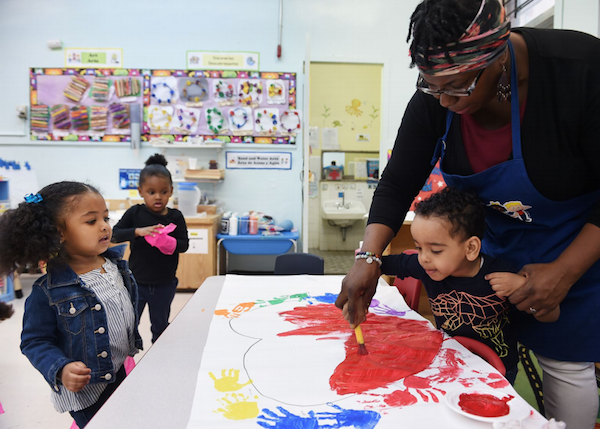
Child care (photo: Comptroller's Office)
Nearly one year into COVID-19, New York is the epicenter of an unparalleled child care crisis. Women have left the workforce in record numbers as the burden of holding together families falls disproportionately on them, child care options dry up and remote schooling remains our children’s new normal for the foreseeable future. Unsurprisingly, women of color are bearing the brunt of the job losses, with Black women and Latinas experiencing the highest rates of unemployment nationwide. At the same time, child care programs – mostly women-run – are struggling to hold on under the financial strain of pandemic-related expenses and declining revenues.
But make no mistake – this crisis is one of our own making. For decades, government has failed to invest in child care as a public good, leaving families with a patchwork of unaffordable options of varying quality and providers, especially those in our underfunded subsidized system, with poverty wages and no resources to weather this emergency. As the pandemic descended on the city, these fault lines only deepened and reinforced gender and racial disparities in the workforce and at home.
Long before the pandemic, we proposed building out a comprehensive infant and toddler care system, NYC Under 3, to build upon the city’s existing pre-kindergarten infrastructure and provide high-quality, affordable child care to New York City children aged zero to three. Through a small child care tax on the top 5% of the city’s biggest employers, we could begin charting a path to universal access – expanding care to tens of thousands of low- and moderate-income families currently shut out of support, raising wages of the care workforce, and eliminating child care deserts across the city.
But now we need to focus on the emergency at hand and recognize that there will be no economic recovery – not for women, and especially not for women of color – without child care.
The good news: the federal government can rescue the child care sector. New York State is slated to receive $450 million in emergency child care funds through the Consolidated Appropriations Act that Congress passed at the end of December. The Biden-Harris Administration has earmarked another $40 billion for child care in their American Rescue Plan. If Congress approves close to this amount, New York would likely see another $1 billion in child care funding.
The bad news: New York previously received more than $160 million in CARES Act funds to stabilize the child care sector, and the allocation of those dollars has been complicated by delays and red tape – preventing dollars from quickly getting into the pockets of the providers most in need of support and hurting the options available to families.
New York State must submit a plan this month for how it will spend the emergency funds. It is critical that these new resources are distributed to families and providers efficiently and strategically. The State should look to the proposal outlined by the Empire State Campaign for Child Care, which recommended directing a share of funds to shore up the existing subsidy system, which primarily serves lower-income New Yorkers, and getting low-barrier stabilization grants directly to providers to make up for lost revenue over the last year.
Even before the pandemic, there was only enough capacity to serve one in five infants citywide. It is critical that we invest now to ensure financially-strapped programs aren’t forced to close their doors permanently – and families aren’t left with even fewer options.
Parents and child care providers must also have a seat at the table in deciding how resources are spent. This is not just good governance; having those closest to these challenges participating in decision-making processes makes for better policy.
Even if we get this next step right, covid relief is not a long-term solution to our child care crisis. The State and City must step up and do what is needed to actually expand access to quality, affordable child care. Additional state and local investments are particularly important to ensure families whose immigration status makes them ineligible for federal relief are not excluded.
With federal resources on the way and the next State and City budgets under negotiation, we have the chance to build a strong foundation upon which we can work toward the day when high-quality, affordable child care is available to all.
***
Scott M. Stringer is the New York City Comptroller. State Senator Jessica Ramos represents parts of Queens. On Twitter @scottmstringer & @jessicaramos.
***
Have an op-ed idea or submission for Gotham Gazette? Email This email address is being protected from spambots. You need JavaScript enabled to view it.